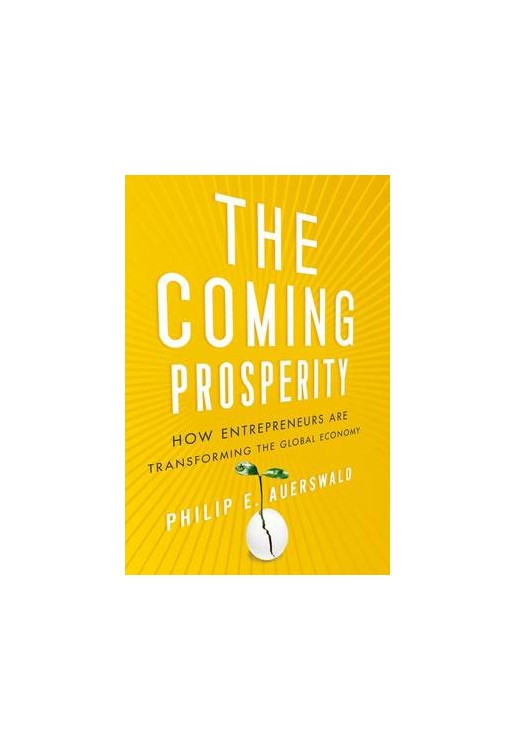Over the course of the next 25 years, it is estimated that nearly eighty percent of global economic growth will originate in previously poor places. Large countries with burgeoning populations such as China, India, and Brazil have economies that have exponentionally grown over the last few decades, and projections indicate that they will continue to do so for some time to come. While the challenge that this 'rise of the rest' poses to the United States' current
economic hegemony has risen concern amongst economists and businesses.
In The Coming Prosperity, Philip Auerswald argues that the introduction of the majority of the world's population into the global economy should be considered a source of opportunity. As technology spreads and communication between populations improves, more people will have a greater opportunity to create economic value for themselves and society than ever before. Auerswald asserts that the success of integrating developing populations and societies into the global economy lies with
the entrepreneur. Inventors, innovators, and the creators of new ventures form the basis for future economic prosperity, and in the developing world, where new technologies and global knowledge networks are being introduced, the opportunities afforded to entrepreneurs are rapidly becoming available. Auerswald
links personal, social entrepreneurship narratives with a more global movement, in which developing economies are not threats to the world's stability, but rather unique opportunities to discover new pathways toward progress and the coming prosperity. The Coming Prosperity is an entertainingly enlightened read on the inherent value of entrepreneurial activity. Auerswald writes with a humorously incisive monologue that gives it a general accessibility, and should certainly be read by policy-makers, businesses, and would-be entrepreneurs. However it is also filled with well-referenced articles from a multitude of academic disciplines that can be useful for academics interested in entrepreneurship studies. * Maria Carvalho, London School of Economics * Philip Auerswald shows the role that innovators must play if we are to create 'The Coming Prosperity.' In this important book, he reminds us that challenging the status quo is the inescapable first step toward building the future of our dreams. * President Bill Clinton, Founder of the William J. Clinton Foundation and 42nd president of the United States * With compelling writing, Auerswald offers an enjoyable and thought-provoking read. * Publishers Weekly * Lively writing style, and the analysis is lightened with personal anecdotes and pop-culture references * Matthew Rees, Wall Street Journal * Philip E Auerswald is a passionate advocate of the power of human creativity and the entrepreneurial spirit to overcome the many obstacles to economic and social development. ... The style is lively and accessible to any interested reader but still has an edge to provoke the specialist.
Introduction: The Time of Our Lives ; Part I: Strength in Numbers ; Chapter 1 - Car Trouble ; Chapter 2 - Demographic Dividends ; Chapter 3 - I'm So Bored With the PRC ; Chapter 4 - Positive Insurgencies ; Part II: The Animating Element ; Chapter 5 - Mobilizing the Masses ; Chapter 6 - You Are What You Venture ; Chapter 7 - The Way of the Empty Hand ; Chapter 8 - Before Adam Smith ; Chapter 9 - What's Good for GMEL ; Part III: Participatory Prosperity ; Chapter 10 - Time to be What Matters ; Chapter 11 - Collaborative Advantage ; Chapter 12 - From Passion to Purpose ; Part IV: The Next America ; Chapter 13 - Fear Itself ; Chapter 14 - Left, RightELForward ; Chapter 15 - You Ain't Seen Nothin' Yet


